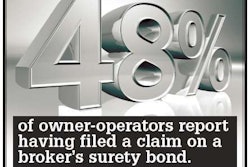Small brokers oppose proposed regs to increase the minimum bond to $100,000 and add other owner-operator protection.
The high-profile case of fraudulent freight middleman Kulwant Singh Gill stunned many for its sheer brazenness. In March, Gill was sentenced to 11 years in prison and ordered to pay restitution to his carrier victims. In the wake of the case, debate over broker fraud got some new legs.
A big part of that debate is H.R. 2357, or the Fighting Fraud in Transportation Act, introduced in Congress last year. It’s been included this year in attempts at a multi-year transportation reauthorization bill in the House and Senate. The measure would raise the broker surety bonding minimum requirement from $10,000 – a level that hasn’t been changed since the late 1970s – to $100,000.
Moreover, it would impose new requirements on brokers and freight forwarders and the financial services companies that back them. At press time, the two-year MAP-21 Senate legislation that included the bond hike was in a House-Senate conference committee. There, it would be combined with a House-approved temporary extension of current funding levels. New initiatives, like the bond increase, might not survive the committee compromise.
Supporters of the hike, including the Owner-Operator Independent Drivers Association and the Transportation Intermediaries Association, which represents large and some smaller brokers, say the increased bond would make it more difficult for irresponsible operators to enter the business.
New regulatory requirements would also help ensure prompt payment to owner-operators who utilize brokers. Specifically, surety providers would be required to pay claims no later than 30 days after the 60-day period for submission of claims. They would also have to post public notices of claims and to notify the Federal Motor Carrier Safety Administration in advance of any pending bond cancellation.







